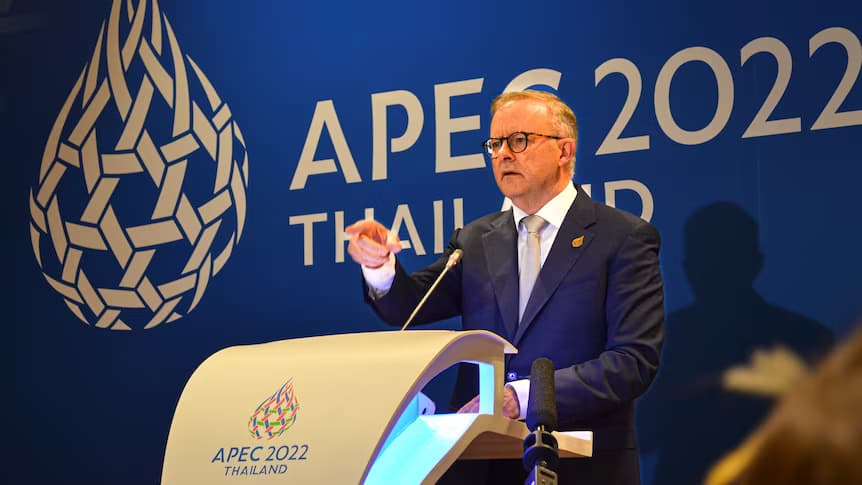We're loading the full news article for you. This includes the article content, images, author information, and related articles.
A high-level meeting between the leaders of Australia and China, two of Kenya's major economic partners, could influence global trade dynamics, investment flows, and diplomatic priorities relevant to Nairobi and the East Africa region.

Australian Prime Minister Anthony Albanese and Chinese President Xi Jinping held an informal discussion on Friday, 31 October 2025, on the sidelines of the Asia-Pacific Economic Cooperation (APEC) summit in Gyeongju, South Korea. The meeting captures global attention amid shifting geopolitical alliances and ongoing efforts to stabilise relations between the two Pacific powers. According to reports, Mr. Albanese raised concerns over a recent military incident in the South China Sea, while also welcoming dialogue between the United States and China, which took place a day earlier at the summit.
For Kenya, the dialogue between its key partners is of significant economic consequence. China stands as Kenya's largest trading partner and primary source of imports. In the first quarter of 2025, total trade between the two nations reached approximately KSh 305 billion (US$2.24 billion), an 11.9% increase year-on-year, according to data from China's General Administration of Customs. This relationship has been foundational to major infrastructure projects, including the Standard Gauge Railway, though it has also contributed to a significant trade imbalance.
Australia, while a more modest trading partner, maintains a growing relationship with Kenya, celebrating 60 years of bilateral ties in October 2025. In 2023, Kenyan exports to Australia were valued at around US$25.6 million, with imports from Australia at US$100.1 million. Recent discussions have focused on deepening cooperation in mining, agriculture, maritime security, and creating pathways for an Economic Partnership Agreement (EPA).
A continued thaw in Sino-Australian relations could have multifaceted effects for East Africa. On one hand, improved stability between the two global players could foster a more predictable international trade environment, benefiting import- and export-dependent economies like Kenya's. The leaders' discussions often focus on upholding the rules-based multilateral trading system through forums like the WTO and APEC, which is vital for smaller economies.
Conversely, a realignment of priorities could see China and Australia focus more intensely on their immediate region. Analysts have noted that as China deepens its economic ties in Africa, particularly in securing critical minerals and developing infrastructure under the Belt and Road Initiative, it could create new competitive dynamics for Australian exporters. Some analysis suggests that China's extensive investments in African mining and infrastructure could eventually position the continent as a direct competitor to Australia in supplying raw materials to the Chinese market.
Kenya's strategic position in the Indian Ocean, a critical maritime route, makes the security and diplomatic posture of nations like Australia and China particularly relevant. Australia has recently engaged with Kenya on enhancing maritime security cooperation in the Indian Ocean, which handles nearly a third of global container traffic. The Albanese-Xi meeting, therefore, is not just about trade but also about the broader security architecture of the Indo-Pacific, which has direct implications for East Africa's coastal states.
The meeting in Gyeongju underscores the interconnectedness of the global economy. For Kenyan policymakers and business leaders, the key takeaway is the need for agile economic diplomacy. Nairobi continues to pursue a more balanced trade relationship with Beijing, seeking greater market access for its agricultural products like avocados and tea, which have seen rising import figures in China. Simultaneously, Kenya is working to elevate its partnership with Australia to a formal EPA, aiming to attract more investment and open new export markets. Monitoring the evolving relationship between Canberra and Beijing will be crucial for navigating the opportunities and challenges that arise from their strategic recalibration. FURTHER INVESTIGATION REQUIRED into the specific outcomes of the leaders' discussion to fully assess the direct impact on existing bilateral agreements with Kenya.
Keep the conversation in one place—threads here stay linked to the story and in the forums.
Sign in to start a discussion
Start a conversation about this story and keep it linked here.
Other hot threads
E-sports and Gaming Community in Kenya
Active 9 months ago
The Role of Technology in Modern Agriculture (AgriTech)
Active 9 months ago
Popular Recreational Activities Across Counties
Active 9 months ago
Investing in Youth Sports Development Programs
Active 9 months ago